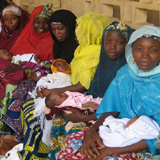
Systematic screening, a USAID best practice developed by Population Council, is a simple procedure allowing health care providers to address multiple needs of a client during a single visit. A modified systematic checklist with particular sensitivity to postpartum women is necessary as they may be amenorrheic, breastfeeding and not perceive themselves to be at risk of pregnancy. In 2009, postpartum systematic screening covering postnatal care, antenatal care, family planning (including counseling on postpartum family planning), immunization and other relevant services was piloted in Northern Nigeria and an evaluation was conducted. The objectives of the evaluation were to determine the effectiveness of postpartum systematic screening as a means to increase service use, particularly postpartum family planning. The evaluation used pre- and post- intervention approaches and sources of data included: observations of provider-client interactions; provider interviews; client exit interviews; and service statistics.
With this postpartum systematic screening checklist, clients attending immunization, newborn care and pediatric/sick baby services were more likely to be screened for FP, postnatal care and immunization services (17% vs. 68%, 13% vs. 57% and 47% and 89%, respectively). In response to high unmet need for FP (88%), the majority (73%) of trained providers knew at least three family planning methods that are suitable for postpartum women, and all of them were providing family planning counseling to pregnant or postpartum women. While family planning referral increased dramatically, few women (15%) said they would go for referrals on the same day.
In addition to the evaluation, this report also presents recommendations for future implementation and scale-up possibilities.